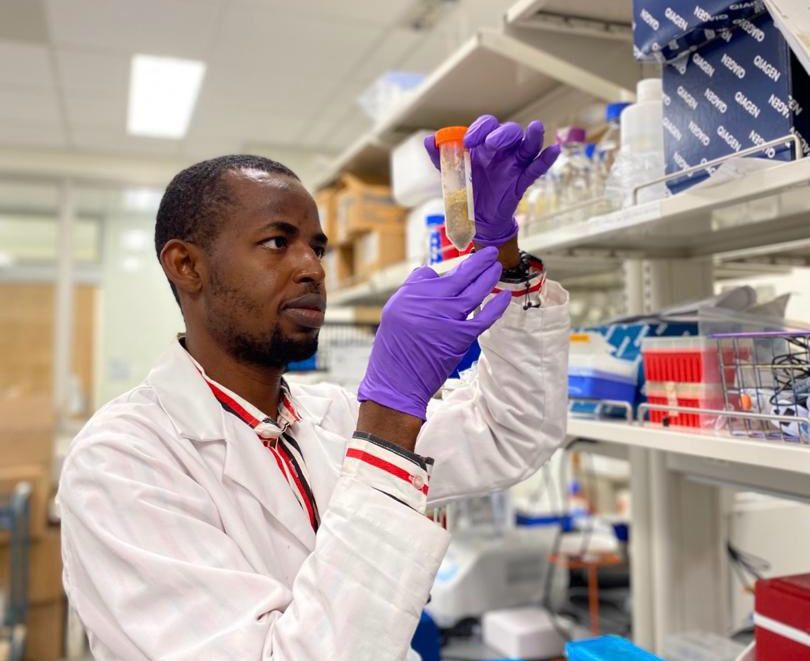Paul Oladele is a microbiome scientist and researcher specializing in intestinal microbiology and antibiotic resistance as a one health challenge. His research explores how microbiome-based interventions can replace antibiotics in animal and human systems to combat antibiotic resistance, a growing public health threat. In this interview with Wale Olapade, he discusses his work, the risks of antibiotic overuse, and how microbiome-based alternatives could shape the future of livestock production in Nigeria.
Your research focuses on the microbiome and its role in reducing antibiotic use in animal production. What inspired you to explore this field?
Thank you for the opportunity to discuss this critical issue. My interest in microbiome research began with my background in animal science, nutritional physiology, and microbial genomics. We use a lot of antibiotics for animal production which is causing widespread increase in antimicrobial resistance. This is a major global health threat, as we depend on antibiotics a lot. If we do surgery, we need antibiotics to prevent infection.
Globally, 1.14 million deaths were due antibiotic resistance, and this is projected to even increase to 1.91 million deaths by 2050. If we want to ensure that antibiotics required critical lifesaving care for humans is still available, we need to reduce the overuse and misuse of antibiotics for human. Because resistance can be transferred from animal pathogen to human pathogen. Because of the serious public health risks, my research focuses on identifying microbiome-based alternatives such as probiotics, prebiotics, and fecal microbiota transplants (FMTs) to reduce reliance on antibiotics while maintaining animal health and productivity.
Can you explain how microbiome-based alternatives work and why they are effective substitutes for antibiotics?
Microbiome-based alternatives harness the power of beneficial gut microbes to promote health and immunity in livestock. The gut microbiome plays a crucial role in nutrient digestion, immune modulation, and pathogen exclusion. By strategically modulating the microbiome, we can achieve the same benefits antibiotics provide like disease prevention and enhanced growth performance without contributing to antibiotic resistance.
Some key approaches include probiotics which are beneficial bacteria like Lactobacillus. This is actually a commonly used probiotics by human. Prebiotics like inulin and fiber-rich feed additives can also enhance the growth of beneficial microbes. Also, Fecal Microbiota Transplants (FMTs) which involves transferring healthy gut microbes from one animal to another to restore microbial balance is a power one. My research has focused heavily on FMT, and I have shown that FMT can improve growth performance and gut health while reducing post-weaning diarrhea, a major reason for antibiotic use in piglets. This is an area where I have work one extensively at a major University in the United States. There is also phage therapy. You see we have a lot of options.
How does antibiotic resistance in livestock impact human health?
The overuse of antibiotics in livestock creates a dangerous spillover effect that extends to human health. Resistant bacteria from farm animals can spread to humans through multiple pathways, including food chain contamination where resistant bacteria can persist in meat and dairy products, leading to human exposure through consumption.
Environmental transmission in which antibiotics and resistant bacteria are excreted in animal waste, contaminating soil and water sources that human come in contact with. Direct animal-human contact where farm workers and veterinarians are at high risk of direct exposure to resistant pathogens is another channel of transmission of resistance. This growing crisis means that previously treatable infections in humans are becoming more difficult and expensive to manage, leading to increased morbidity and mortality from antibiotic-resistant diseases. An example is C. difficile which is almost completely resistant to all class of antibiotics.
Why Are Microbiome-Based Alternatives Lacking in Developing Countries Like Nigeria?
While developed nations such as the United States and European countries have made significant progress in reducing antibiotic use in livestock production, many developing countries, including Nigeria, are still heavily reliant on antibiotics. This is mostly due to limited funding for research but other factors like unfavorable regulatory policies and limited farmer awareness also play a role.
You know, our people want instant result, many farmers continue to rely on antibiotics as a quick fix for disease prevention and growth promotion without considering long-term consequences.
Government also has a role to play. We need to increase regulation on antibiotic use and enforce it. This are the thing we will make efforts to use alternatives like microbiome worth pursuing.
That sounds like such a challenge. Given your expertise in this area, what do you think needs to be done to promote microbiome-based alternatives in Nigeria?
We have a long way to go and I believe we can get there! However, several key actions must be taken. First, we need to increased government funding for microbiome research and provide an environment that supports innovation like good infrastructure. Also, we need stronger antibiotic regulations. Policies should be enforced to limit antibiotic use in livestock, similar to the restrictions we already have in Europe and the U.S. We then need to educate farmer on these new methods. All these can only be achieved with a collaboration between public and private institutions. We need everyone to buy into it, universities, research institutions, and the agricultural.
Thanks for sharing! What Impact Do You Hope Your Research Will Have on the Future of Sustainable Animal Production in Nigeria?
My ultimate goal is to reduce antibiotic dependency in livestock production by providing scientifically validated microbiome-based solutions. If widely implemented, these approaches can enhance animal health and productivity without antibiotic overuse which will reduce the spread of antibiotic-resistant pathogens, and protect both animal and human health. I am already developing solutions that will reduce antibiotic use in the United States and I hope I can bring my experience to improve things in Nigeria too.
Final Thoughts: If You Could Advise Farmers and Policymakers, What Would Be Your Key Message?
Farmers can start exploring microbiome-based solutions today, whether through probiotics, dietary interventions, or improved gut health strategies. This will really help to future-proof their farms against antibiotic restrictions.
Policymakers should prioritize investment in microbiome research and enforce responsible antibiotic use policies to ensure a sustainable, antibiotic-free future for animal agriculture.






